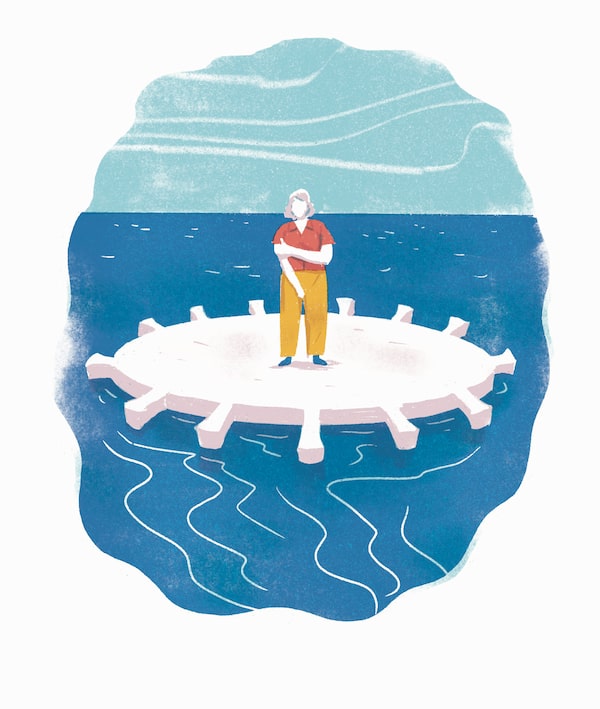
Illustration by Drew Shannon
Coronavirus is contaminating its way across Canada. We all know it, even if we haven’t yet been able to wrap our brains around the fact. How many times did we view China’s hauntingly empty streets or contemplate the horrific, mind-boggling statistics coming out of Italy? What will it take to shake us into understanding that the tsunami we’ve been warned about might drown us, too?
Like many others, I read the news with rapidly increasing apprehension. It happens that I’m one of those with compromised lungs. I was raised in a haze of waved-away, second-hand cigarette smoke and then exposed to a chemotherapy drug that further damaged my ability to breathe. So, yeah, I’m worried.
I hear that some of the young are shrugging off the imminent death of the vulnerable in our society. After all, what good are we? We’re sick or we’re old or both. No value added here. Plus, we practically invented climate change, so we deserve what we get, right?
I’m a doctor who just emerged from two weeks of quarantine. Here’s my advice
This is like wartime, I have heard, as hospitals move inexorably toward the inevitable. Decisions will need to be made. Triage will happen and, even if coloured armbands are not distributed to delineate the we’ll-do-everything-possible-for-you versus the we’re-giving-up-on-you, currently unimaginable choices will soon take place. Who will doctors decide is worth saving, and who should be left to die?
(Over and over, I think of that battlefield scene in Gone with the Wind, where doctors walk helplessly among an endless array of men who groan and die in agony.)
Italy has come up with a draft of triage guidelines. The front-line health workers have been told, “Give priority to those with ‘greater life expectancy.’” They have been instructed to make health care decisions based on “ the principle of maximizing benefits for the largest number.” In non-bureaucratic language, that translates as they’re going to choose to let you go (ah, euphemisms) if you’ll be more of a drain on the health-care system later. I do get it, at least in theory. Why save some now only to have these people cost society more in the future?
Then the crisis starts to become more personal. Where do I stand on this continuum? In my current state of denial, this is still just an interesting philosophical dilemma. Would I be saved? How much am I worth to society? Not as much as a middle-aged doctor, surely, who could recover and help others. Not as much as a 30 year old, who has a whole life ahead to work and earn and procreate and love and laugh.
Thank God I’m “only” 66; my chances of being medically written off decrease the farther I am under the age of 80, even more so under 70. Please don’t make me contemplate those I love who crossed that age marker, some of them more than a few years ago.
There’s more. In addition to age, the crushingly under-resourced doctors and nurses in Italy are also advised to take a patient’s overall state of health into account: “The presence of comorbidities needs to be carefully evaluated.”
That last point doesn’t feel quite as reassuring. Would my bouts of cancer count against me? But they weren’t my fault!
And my crummy lungs? A lifelong non-smoker, I find myself subject to regular bouts of pneumonia or bronchitis; in between, I revel in being able to take a deep breath without coughing. None of it is my fault, but in the end (which I truly hope this isn’t), who cares? Probably not you. This is my reality.
I’m retired, too; my earning years are behind me. What do I have to contribute to society, aside from being a good person, careful with other people’s feelings, who’s looking forward to dancing at a son’s wedding this summer, holding her not-yet-conceived grandchildren? Do you get bonus points for being compassionate? For being nice or kind or a decent wife/mother/friend? For writing passably witty poems in honour of some of the people you care about? For making those you love laugh or just roll their eyes as you try to make them laugh?
The choices facing our medical staff make them downright god-like, bringing to mind the prayer we recite on Yom Kippur. “Who shall live and who shall die” is, we are told, determined and written in the Book of Life during the Jewish Days of Awe. We read every year that the trilogy of repentance, prayer and charity “temper judgment’s severe decree.” I’ve been pretty good on the charity front, fair to middling on the others. But really: given the apocalyptic updates I read on my phone, how can any of this matter? Is it irreverent of me to think this way or only practical?
I do what I can: wash my hands, stay at home, practise social distancing. When I do go out, my neighbours and I give each other a wide, sheepish, distrustful berth.
A sense of unreality looms everywhere. The world seems to be standing still, holding its breath. Can this really be happening? Not here, surely. This is Canada. The birds have just started to sing again!
Jo Meingarten lives in Toronto.
First Person is a daily personal piece submitted by readers. Have a story to tell? See our guidelines at tgam.ca/essayguide.